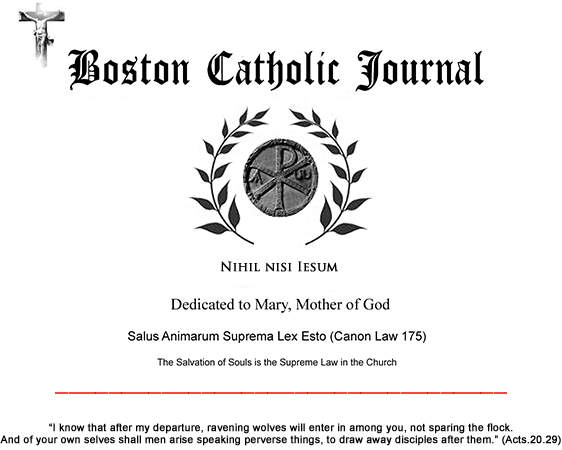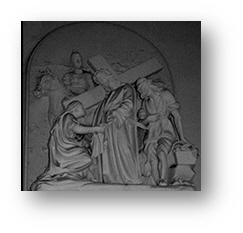| |
||||||||||||||||||||||||||||||||||
|
CHAPTERS |
|||||||||||||||
READING THE HOLY SCRIPTURE
|
“TRUTH,
not eloquence, is to be sought in reading the Holy Scriptures;
and every part must be read in the spirit in which it was
written. For in the Scriptures we ought to seek profit rather
than polished diction. |
Click
here to listen to this chapter
Sister’s Commentary:
It
is undoubtedly true that translations of the Bible vary, and that not
all equally attract us. Each translation, however, has something to
offer to someone. What one translation offers poetically, another may
offer in the way of clarity. Words written in one edition we may fail
to grasp, where in another it may be far clearer to us. Perhaps in light
of this multiplicity of translations, or even the footnotes accompanying
the same translation, we can easily find ourselves distracted from the
very text to which we apply ourselves. There is great danger when we
are pulled aside from an otherwise clear message by allowing ourselves
to be distracted by non-essentials and falling into unprofitable disagreements
and arguments about words particular to one translation that are not
of themselves important, except inasmuch as we use them as the opportunity
to display our “learnedness”. Thomas is very clear that what we should
seek in our reading is spiritual profit, not the vain veneer of literary
erudition.
We can miss the message, miss the touch of the Holy Ghost, entirely
by becoming involved in vain and petty quarrels over words, as though
by substituting a single brick we can change the entire edifice. What
matters is what God is saying to us — and our response to it!
The Imitation also invites us to appreciate, to explore, and to acquire
some familiarity with the great writings of the Church Fathers, her
Saints, and her spiritual writers in our seeking the “Pearl of Great
Price”, the truth of Jesus Christ within them.
Thomas also warns us against the crippling mentality of being quick
to follow certain literary writers who have become contemporary names
and celebrities. This is vanity, in both senses of the word. Such people
often endeavor to obtain and read their material, not so much for its
content or inherent value (if indeed it has more than passing value),
but because in doing so they endeavor to impress others with their having
read “so and so” who is popular for the moment, often despite the insipid
or trite nature of his work that lends itself to the imagination of
many and the edification of none.
We must have the humility to recognize our literary limitations — and
we all have them — and to exercise both discretion and self-discipline
in our spiritual reading. We cannot, and in very deed should not, attempt
to read everything indiscriminately advertised and promoted. Authors
and publishing houses are very adept at piquing our curiosity — always
for a profit … their profit — and at the expense of a promiscuous reader
who cares little for sorting fact from fiction, and as a result falls
into the most absurd beliefs. New Age literature is only one such venue,
and it panders to whatever we wish it to be, regardless of the truth
and most often at the cost of it. To read much is not to learn much.
Studying the Bible from an historical point of view can be very interesting
and it can enhance our understanding and acquaintance with the culture
and background of the time, but arguing about how many bricks of what
size and composition were laid at the building of the temple, or why
the River Jordan was three feet deep in one place and six in another,
is quite beside the point. Indeed, numbingly so.
Many spiritual books could, in truth, be succinctly summarized on a
single page. This is true. But it is not profitable. Extrapolate a point
endlessly until it attains the minimum pagination of a book, and sell
it. That may be “Good copy”, so to speak, but ultimately poor literature
and of no value. Instead, determine to read Holy Scripture which is,
after all, the source and inspiration of all genuine spiritual literature!
Holy Scripture is not simply, or even largely, “literature”; it is
life-giving! It brings us Jesus Christ Who IS the Life,
the Truth, and the Way. Any given passage is either a warning, a correction,
a consolation, or a course of action exemplified for us.
It is not the amount we read but how we read and whether it leads to
inner conversion and subsequent good choices. This is the ultimate in
“good” reading. Little wonder that Holy Scripture, the Sacred Bible,
remains the best-selling book on Earth for all time.
Your Little Sisters in Christ
![]() Printable
PDF Version of Sister's Commentary on Chapter 5
Printable
PDF Version of Sister's Commentary on Chapter 5
|
Totally Faithful to the
Sacred
Deposit of Faith
entrusted to the Holy See in Rome
“Scio
opera tua ... quia modicum habes virtutem, et servasti verbum
Meum, nec non negasti Nomen Meum”
Copyright © 2004 - 2026 Boston Catholic Journal. All rights reserved. Unless otherwise stated, permission is granted by the Boston Catholic Journal for the copying and distribution of the articles and audio files under the following conditions: No additions, deletions, or changes are to be made to the text or audio files in any way, and the copies may not be sold for a profit. In the reproduction, in any format of any image, graphic, text, or audio file, attribution must be given to the Boston Catholic Journal.
|






















